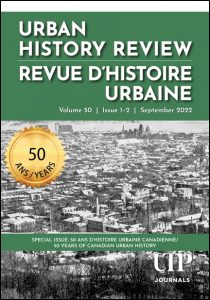Written by guest blogger Richard Harris.
We take things for granted … until we can’t. For decades, citizens in western democracies assumed that, even when our chosen party lost an election, the political system itself was resilient. Recent events in—well, take your pick—have challenged this.
I faced a challenge, in a much more modest way, as a graduate student at Queen’s University in 1975. Peter Goheen, who was leading the seminar in urban historical geography, prompted me to think about why I was interested in studying cities. He was asking the class to consider a deceptively simple question: “why do cities matter”? He wasn’t asking “what happens in cities that we should care about,” but “how does the urban context influence what happens there?” On and off, I’ve spent my academic career trying to figure that out.
So, of course, have a number of other urbanists, including historians. I happen to think that those who think historically have the best answers, and for two reasons. First, because they know that social consequences of any sort take time to work their way out, sometimes months, but often years or decades. Second, historians like to tell stories, and without jargon. In principle, what they say can reach a large audience.
 That is why I so much enjoyed writing my survey article for this anniversary issue of the Urban History Review. This self-imposed task nudged me to situate my own intellectual development in the relation to the evolution of urban history in Canada, and beyond. As it happened, 1975 also saw the first urban history conference in Canada, in Guelph. Conveniently located down the 401 highway, I was able to attend, and it was this conference which confirmed – or maybe determined, I forget which – my historical inclinations.
That is why I so much enjoyed writing my survey article for this anniversary issue of the Urban History Review. This self-imposed task nudged me to situate my own intellectual development in the relation to the evolution of urban history in Canada, and beyond. As it happened, 1975 also saw the first urban history conference in Canada, in Guelph. Conveniently located down the 401 highway, I was able to attend, and it was this conference which confirmed – or maybe determined, I forget which – my historical inclinations.
Yes, my memory can play tricks, and it is undoubtedly coloured by nostalgia, too. In my survey I conclude that, in the words of an old song, ‘fings ain’t wot they used to be’. In the course of discussions with colleagues over the next several months, I discovered that I was right, but not altogether in the ways that I had supposed. More people are asking new questions, and in new ways, than I had supposed. In the process they are showing, or at the very least implying, new ways of answering the question that Peter Goheen posed all those years ago.
Check out what they have to say! It’s important. Yes, what has been happening in Canadian cities has shaped our lives today. But what we also need to know is how much of that is down to the fact of city living. House prices, which I mention in my article, is as good an example as any. It is not the price of the dwelling that costs so much, it’s the land. And it is the concentration of people in cities that pushes up the price of land. How that came to be, and how we should deal with it, is one of the great questions of our time. No one is better placed to figure out how that came to be than someone who thinks historically.
About the Author
 Richard Harris is an emeritus professor of urban geography at McMaster University, fellow of the Royal Society of Canada, and past president of the Urban History Association (2017–8). He has written about the history of housing, housing policy and finance, neighbourhoods, and suburbs in Canada, the United States, and British colonies. His most recent work is How Cities Matter (Cambridge, 2021). He is currently writing a history of Canadian neighbourhoods, 1880s-2020s.
Richard Harris is an emeritus professor of urban geography at McMaster University, fellow of the Royal Society of Canada, and past president of the Urban History Association (2017–8). He has written about the history of housing, housing policy and finance, neighbourhoods, and suburbs in Canada, the United States, and British colonies. His most recent work is How Cities Matter (Cambridge, 2021). He is currently writing a history of Canadian neighbourhoods, 1880s-2020s.
His article, “The State of Urban History in Canada” was published in the Urban History Review 50.1-2 Special Issue: 50 Ans D’Histoire Urbaine Canadienne/50 Years of Canadian Urban History.
Comments on this entry are closed.